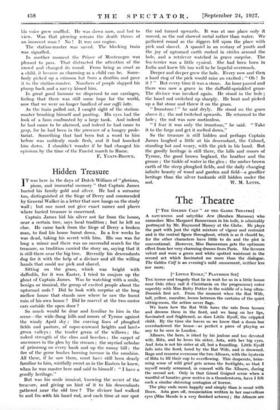Hidden Treasure
-IT was here in the days of Dutch William of "glorious, pious, and immortal memory " that Captain James buried his family gold and silver. He had a surname too, distinguished at the Siege of Derry and commended by General Walker in a letter that now hangs on the study wall ; but one must not give exact names and places Where buried treasure is concerned.
Captain James hid his silver not far from the house, near a certain tree, says local tradition ; but he left no clue. He came back from the Siege of Derry a broken man, to find his house burnt down. In a few weeks he was dead, taking his secret with him. His son was for long a minor and there was no successful search for the treasure, so tradition carried the story on, saying that it is still there near the big tree. Recently his descendants dug for it with the help of a diviner and all the willing hands that could use pick and shovel.
Sitting on the grass, which was bright with daffodils, for it was Easter, I tried to conjure up the ghost of Captain James. Was he watching with a smile, benign or ironical, the group of excited people about the upturned sods ? Did he look with surprise at the long mellow house that stands now where he saw the burnt ruin of his own house ? Did he marvel at the two motor cars outside the open door ?
• So much would be dear and familiar to him in the scene—the wide-flung hills and moors of Tyrone against the windy April sky ; the curving lines of ploughed fields and pasture, of copse-crowned heights and lard:- green valleys ; the tender green of the willows ; the naked strength of the elms and beeches ; the carpet of anemones in the glen by the stream ; the myriad nebulae of primrosc‘s on every bank and up the mossy hill ; the fire of the gorse bushes burning incense in the sunshine. All these, if he saw them, must have still been dearly familiar to him, wistfully sweet as in the Easters he knew, when he was master here and said to himself : " I have a goodly heritage." . .
But was his smile ironical, knowing the- secret of the treasure, and giving no hint of it to his descendants gathered. near the old tree ? The .diviner had walked to and fro_Apith his hazel rod, and each time at one spot the rod_ turned upwards. It was ,at one place only it moved, so the rod showed metal rather than water. We gathered round as the diggers fell upon the place with pick and shovel. A spaniel in an ecstasy of youth and the joy of upturned earth rushed in circles . around the hole, and a retriever watched in grave surprise. The fox-terrier was a little cynical. She had been born in India and knew life too well to be hopeful overmuch.
Deeper and deeper grew the hole. Every now and then a hard ring of the pick would raise an excited : " Oh ! Is it ? " But every time it was a stone. An hour passed and there was now a grave in the daffodil-sprinkled graSs The diviner was invoked again. He stood in the bole ; the hazel rod switched up sharply. . He bent and picked up a flat stone and threw it on the grass.
" Ironstone ! " he said dryly. He stood on the grass above it ; the rod twitched upwards. He returned to the hole ; the rod was now motionless.
" I fear it was only the ironstone," he said. " Take it to the forge and get it_ melted down."
So the treasure is still hidden and perhaps Captain James laughed a little at his descendant, the Colonel, standing hot and weary, with the pick in his hand. But the goodly heritage is still there, the hills and moors of Tyrone, the good brown bogland, the heather and the grouse ; the tinkle of water in the glen ; the umber brown earth of the steep ploughed fields, and the daily changing infinite beauty of wood and garden and field—a goo. dlier heritage than the silver tankards still hidden under the










































 Previous page
Previous page